NEWS
NMP launches new lactation station
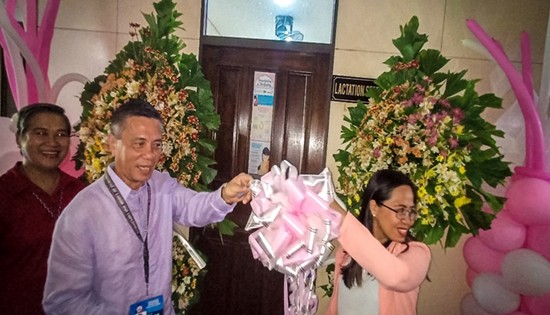
By National Maritime Polytechnic
August 22, 2019
TACLOBAN CITY – Pursuant to Republic Act No. 10028, also known as the Expanded Breastfeeding Promotion Act of 2009, mandating the establishment of breast feeding facility in public places and facilities, as well as in government and private workplaces, the National Maritime Polytechnic (NMP) launched its lactation station located at the 2nd Floor of the NMP Administration Building, Cabalawan, Tacloban City on 19 August 2019.
A perfect gift for NMP’s working mothers and female clients, just in time for the observance of the National Breastfeeding Awareness Month this August, the launching of the NMP’s lactation station intends to highlight the importance of breastfeeding which has proven to have a lot of beneficial effects not only to babies but also to mothers.
The institution of the lactation station is in support of the State’s policy to protect working women by providing safe and healthful working conditions, taking into account their maternal functions, and such facilities and opportunities that will enhance their welfare and enable them to realize their full potential in the service of the nation.
It is also part of the localization of the Magna Carta of Women (MCW) which aims to address the practical gender needs of working mothers. NMP lactation station is adequately provided with the necessary equipment and facilities, such as comfortable seat; refrigerator for storing expressed breastmilk; lavatory for hand-washing; purified water for drinking; and electric fan for ventilation and is open during weekdays from 8AM to 5PM.
Moreover, in order to raise public awareness on the importance of and to further promote breastfeeding, a Seminar-Lecture on Breastfeeding was facilitated by the NMP Gender and Development (GAD) Committee. Resource Speakers were Ms. Felecita R. Borata and Ms. Kristel Agote from the Department of Health (DOH) Eastern Visayas.
Ms. Borata expressed her appreciation on NMP’s effort of establishing a mother-baby friendly workplace and for promoting, protecting, and supporting breastfeeding.
The lecture highlighted the many benefits of breastfeeding to women and children and the proper positioning and attachment for effective breastfeeding. It was also emphasized that one of the factors that contribute to the success of breastfeeding is the existence of mother’s support group (husbands, relatives, and friends).
The activity was attended by NMP personnel and some residents and barangay officials of Brgy. Cabalawan, Tacloban City.
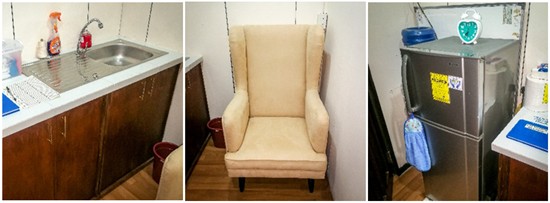
BNS Day caps 2019 Nutrition Month celebration
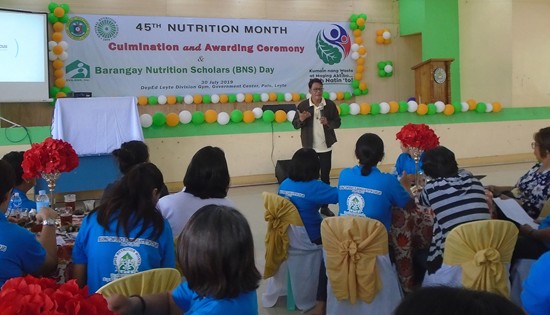
By JACK C. GADAINGAN
August 19, 2019
GOVERNMENT CENTER, Palo, Leyte – About 200 Barangay Nutrition Scholars (BNSs) from around Eastern Visayas’ six provinces gathered here at the Department of Education (DepEd) Leyte Division Gymnasium to mark their being front-liners in the battle against malnutrition in Region 8 on July 30, 2019.
The half-day activity capped the Nutrition Month celebration of July carrying the theme: “Kumain ng Wasto at Maging Aktibo…Push Nation ‘to!” And as the theme directed the serious discussions of the gathering was mixed with more fun activities – all involving physical activity.
Ullasini J. Pangan, Nutrition Officer II of National Nutrition Council Region VIII (NNC-8), tackled a brief discussion on the Nutrition Month Key Messages, wherein she emphasized for everyone to have ONE hour or more of physical activity every day, to reduce screen time (use of gadgets, TV and computers) to TWO hours or less each day, and to eat the THREE food groups every day for variety;
Niño Archie S. Labordo, NNC-8 Nutrition Officer III, the Outstanding Barangay Nutrition Scholar Journey where he revealed that this year Region 8 has a contender to the national level for the Outstanding BNS, as he urged the congregation to strive to become as well; and
Dr. Catalino P. Dotollo Jr., NNC-8 Regional Nutrition Program coordinator, the inspirational message – during which he congratulated each one for a successful event and for their efforts in uplifting the regional nutrition situation.
Lydia O. Nuñez, Eastern Visayas Association of Barangay Nutrition Scholars (EVA-BNS) president, welcomed the BNSs and thanked them for their attendance and continued support of the BNSs Body as well in the fight against malnutrition in the region; Patrocenia De Cadiz, EVA-BNS treasurer provided the closing message.
The fun games of the BNS Day – highly entailing physical activities were divided into Solo Game, Group Game, and 3N1 Dance Contest: the Solo Game were Sipa, Limbo Rock, Hula-Hoop Defying Gravity, Piko, Tsato and Sangkayaw; the Group Game were Patintero, Sack Race, Dodgeball and Tug of War; and the 3N1 Dance Contest were Cha-cha, Boogie and Tango.
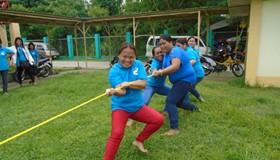
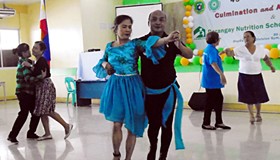
Nutrition Month contests and winners
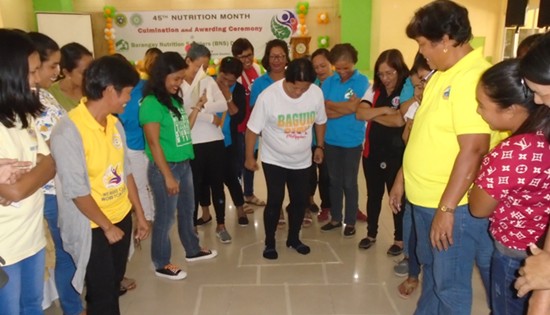
By JACK C. GADAINGAN
August 17, 2019
TACLOBAN CITY – Marking of the 45th Nutrition Month with the theme: “Kumain nang Wasto at Maging Aktibo…Push Natin ‘to!” encouraging to eat healthy diets and espousing active lifestyle by disengaging sedentary behavior, inspired the frontline nutrition managers in Eastern Visayas headed by the National Nutrition Council Region VIII (NNC-8) to list a number of contests – all entailing physical activity as among the highlights of the month-long July celebration.
The recognition and awarding of the contest winners was conducted during the “45th Nutrition Month Culmination and Awarding Ceremonies” on July 30, 3019 held at the Department of Education (DepEd) Leyte Division Gymnasium, Government Center, Palo, Leyte.
NUTRIMAZING RACE, a team contest of eight stations conducted during the Nutrition Month launching on July 5 result: First Place - Leyte Metropolitan Water District, team members John Paul Go, Ranulfo Gamba and Joanne Pacunla, bagging a plaque and P3,000 cash; 2nd Place - Department of Budget and Management 8, team members Neuman Gallardo, Arnel C. Yboa and Carl Patrick Bernardo, bagging a plaque and P2,500 cash; and 3rd Place - Eastern Visayas Regional Medical Center, team members Weinona M. Ligason, Maria Dyna Rose Abrenio and Rolan Jose M. Fua, bagging P1,500.
NUTRIVIDEO CONTEST, a month-long video contest posted on social media: Most Liked and Shared (1077) - Commission on Audit, bagging a plaque and P1,000 cash; Best in Choreography - Land Transportation Office 8, bagging a plaque and P1,000.
NUTRIJNGLE CONTEST, likewise a month-long contest posted on social media: First Place - NUTRISONG by Ginataan Medley, bagging P2,000; 2nd Place - Gulay Sensation by Burauen National High School, bagging P1,500; 3rd Place - PUSH NATIN TO! By Promiseland Educational Academy, bagging P1,000; and Most Liked and Shared - Guly Sensation by Burauen National High School.
BNS LARO NG LAHI, conducted as among the activities during the Barangay Nutrition Scholar (BNS) Day on July 30, 2019.
Individual Games each game bagging P300: SIPA - Southern Leyte Province by Fedelina Mendiola, winner; LIMBO ROCK - Leyte Province by Wilma Sumaste, winner; HULA-HOOP DEFYING GRAVITY - Southern Leyte by Shirley Candelaria, winner; PIKO - Samar Province by Analiza Salamida, winner; TSATO - Eastern Samar by Val Cabus, winner; and SANKAYAW - Samar Province by Lylanie Pamapor, winner.
Group Games with each game bagging P1,200: SACK RACE - Leyte Province, winner; DODGEBALL - Eastern Samar, winner; and TUG OF WAR - Leyte Province, winner.
BNS DANCE CONTEST: First Place - Leyte Province, bagging P4,000; 2nd Place - Catbalogan City, bagging P3,000; and 3rd Place - Baybay City bagging P2,000; non-winning contestants bagged P500 each pair as consolation prize. Judges for the NUTRIVEDIO, NUTRIJINGLE and BNS DANCE contests were: Mr. Eulogio A. Plameran Jr., PLTCOL Anabel Roche and Ms. Winderose Oliverio.
‘Asin’ Summit conducted in Eastern Visayas region
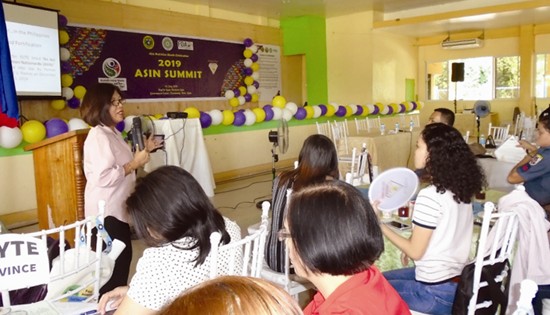
By JACK C. GADAINGAN
August 16, 2019
TACLOBAN CITY – Iodine deficiency remains the single greatest cause of preventable brain damage and mental retardation. Insufficient intakes of iodine during pregnancy and early childhood result in impaired mental development of young children. So that iodization of table salt is mandated by law as it is one of the best and least expensive methods of preventing micronutrient malnutrition in the country, particularly Iodine Deficiency Disorder (IDD).
Felecita R. Borata, Department of Health Region VIII (DoH-8) Regional Nutrition Program Manager, revealed this during the “Asin Summit” conducted on July 26, 2019 at the Department of Education (DepEd) Leyte Division Gymnasium, Palo, Leyte.
The one-day event, a part of July 2019 Nutrition Month celebration activities, was attended by municipal health officers (MHOs), provincial, city and municipal nutrition action officers (P/C/MNAOs), nutritionists/dieticians and rural sanitary inspectors (RSI) from around Eastern Visayas region. Also in attendance were a group of salt-traders from Tacloban City, representatives from government nutrition-partner agencies, nongovernment nutrition organizations, and the media.
Borata tackled the subject “Iodine Prevention and Control Program,” where she scrutinized and explained to the audience the intentions of Republic Act No. 8172 or: “An Act Promoting Salt Iodization Nationwide and for Related Purposes (Asin Law).” Saying that Salt Iodization strategy has been implemented in most countries where iodine deficiency is a public health problem.
The law (RA 8172) intends to ensure that only iodized salt shall be available in the market for human and animal consumption, thereby it requires salt producers/manufacturers, importers, to iodize from 30 to 70 (mg/kg) or parts-per-million (ppm) the salt they manufacture, produce, distribute, trade and/or import, as well as the law further requires salt re-packers to repack and sell only iodized salt.
In Eastern Visayas, the Regional Bantay Asin Task Force (RBATF) is the body mandated to ensure the sustainability of the ASIN Law implementation – as well as to guarantee the iodization of all salt being produced, sold or traded, and utilized in the region. The body is composed of the DOH, NNC, DOST, DTI, PNP, DENR, FDA, PPA, PIA and LGUs among others.
The RBATF for the summit, reported that during a Post Marketing Surveillance on Iodized Salt from seven establishments conducted on November 6, 2018, result of the analysis of salt-samples taken from seven salt establishments in the region failed; and again from another Post Marketing Surveillance on Iodized Salt conducted on November 7, 2018 on salt-samples taken from six establishments, only two passed while the rest failed again.
Considering the volatile characteristics of iodine, the RBTAF engrained some reminders to the congregation, particularly the asin traders, distributors and sellers – that in order to minimize avoidable losses of iodine, iodized salt should not be exposed to any of the following conditions during storage, transport and display: 1. direct sunlight or near source of strong light, 2. high temperature and humidity, 3. contamination with moisture (e.g. rain, flood, etc.), and 4. contamination with dust or filth from the environment.
Save the Children Philippines to mothers: Breastfeed infants exclusively on first 6 months
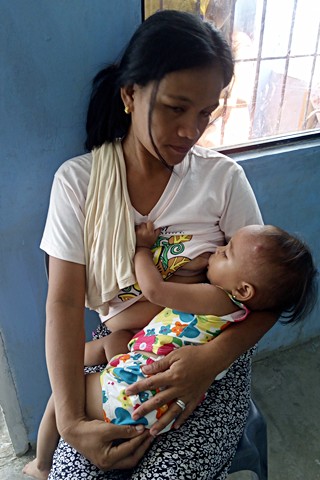
Press Release
August 6, 2019
MAKATI CITY – Save the Children Philippines is urging mothers to breastfeed infants exclusively during the first six months to protect them from diseases such as diarrhea and pneumonia – the world’s leading causes of child death.
The group raised concern on the steady decline of exclusive breastfeeding in the Philippines with 65 to 68.6 per cent of mothers breastfeeding exclusively for the first two months but declining to 29 percent as babies turn 5 months. The figure was reflected in the 2018 Expanded National Nutrition Survey of the Department of Science and Technology - Food and Nutrition Research Institute.
The call was made in time for the World Breastfeeding Week, celebrated from August 1 to 7 with the theme: “Empower Parents. Enable Breastfeeding” to raise awareness on the many benefits of breastfeeding.
Despite known benefits of breastmilk, 60 per cent of the world’s total infants including those in the Philippines are not getting the recommended six months of exclusive breastfeeding.
Lawyer Albert Muyot, Chief Executive Officer of Save the Children Philippines said existing laws including the Milk Code and First 1,000 Days mandate local governments and hospitals to facilitate exclusive breastfeeding for newborn babies up to six months.
He said local health and nutrition workers have a critical role to allow the infant to be breastfed in the first hour after birth and assist mothers to breastfeed exclusively in the first six months and to continue up to two years with complementary feeding.
“Local leaders should invest in health and nutrition of children by hiring adequate number of skilled health and nutrition workers to ensure mothers breastfeed immediately after birth and exclusively up to six months,” said Muyot.
In a research study of Save the Children Philippines, it cited the decline in breastfeeding practice due to the lack of skilled health workers in maternity clinics in the communities.
The study also noted rampant violations of the Philippine Milk Code or Executive Order 51, National Code of Marketing Breast Milk Supplements and Other Products that prohibits the promotion of milk products as breastmilk substitutes.
It also blamed aggressive promotions of giant manufacturers of breastmilk substitutes or milk formula targeting mothers and putting health claims in the packaging that misinform the public that the benefits of breastmilk can be gained from infant formula.
The study noted that there are still milk companies that sponsor trips and conventions of doctors and health workers to encourage them to promote milk products to mothers of infants and young children.
Save the Children Philippines implements a Maternal, Newborn and Child Health and Nutrition program in the most deprived communities in Caloocan, Navotas and Malabon in Metro Manila as well as in the provinces of Sarangani and North Cotabato conflict-affected areas in Mindanao.
Dr. Amado Parawan, Health and Nutrition Advisor of Save the Children Philippines said besides exclusive breastfeeding for six months, mothers should ensure continuous breastfeeding up to two years to guarantee optimum health of their babies.
Save the Children Philippines advocated the passage of the Republic Act No. 11148 or Kalusugan at Nutrisyon ng Mag-Nanay Act that ensures optimum care of a child from conception up to two years or the first 1,000 days of life to reduce malnutrition and child deaths due to preventable causes.
The law, now passed as ordinance in the cities of Malabon, Caloocan and Navotas, and the municipalities of Magpet and Arakan in North Cotabato and Alabel in Sarangani mandates exclusive breastfeeding for babies during the first six months.
More than 30 studies worldwide have shown that breastfeeding provides optimum benefits to both mothers and babies that include:
• Reduces the risk of dying for infants and young children. At least 840,000 neonatal deaths can be prevented annually if breastfeeding is initiated within an hour after birth.
• Boost immune system for infants and young children living in areas with poor sanitation and unsafe drinking water.
• Reduce cases of respiratory tract infections, gastrointestinal infections, urinary tract infections and otitis media among babies and children.
• Reduce rates of Sudden Infant Death Syndrome within the first year of life.
• Decrease incidence of both insulin-dependent and non-insulin-dependent diabetes mellitus among children.
• Reduce possibility of lymphoma, leukemia, and Hodgkin’s disease, obesity, and allergic conditions in children.
• Reduce risks of mothers getting breast cancer, ovarian cancer and type 2 diabetes.
